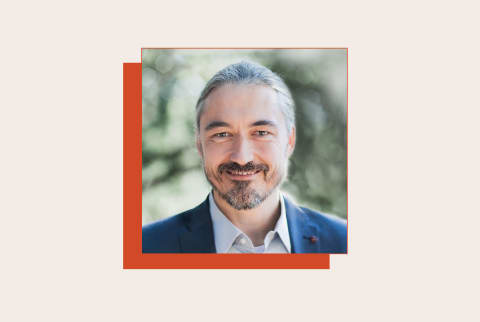
Image by Thomas Hubl, Ph.D.
October 16, 2023
We carefully vet all products and services featured on mindbodygreen using our
Our selections are never influenced by the commissions earned from our links.
We’re continuing to learn more and more about how unresolved trauma can harm your health. But what about generational trauma, or the lingering trauma inherited from your family members? That can be a lot more difficult to even identify, let alone treat.
Well, Thomas Hübl, Ph.D., is here to help: A collective trauma expert, renowned teacher, and author of Attuned, Hübl provides fascinating information on how to recognize your trauma symptoms and even heal ancestral wounds. It’s trauma healing 2.0, and he shares a few of his tricks below:
“When you listen to music, you’re attuning naturally,” says Hübl. (By attuning, he means listening mindfully to any sensations, feelings, images, and information that arise in your body). Think about it: When you sway along or tap a foot to a certain song, you’re in tune with the music.
“The process of attuning is so inherent to our human nature,” he adds. “The only thing I suggest is [to] train that capacity and free it up.” And one way to free that natural capacity is by listening to music. “Bring more joy into your life. More colorfulness, more richness, deeper satisfaction, not just from superficial things but from deep moments and being more connected to our own essence.” Here’s a helpful playlist to inspire a deeper sense of self-awareness.
2.
Connect with yourself & others
Hübl recommends becoming curious about your own emotions. “Get to know the stress levels in [your] own nervous system, get to know [your] reactivity, distancing, or absencing… So [you’re] not just a victim of your nervous system’s inner mechanisms.” Rather, you can slowly train your nervous system to master those sensations as they arise. “Even if it takes time, I can develop a greater literacy in my emotional experience,” Hübl adds.
Once you have more awareness of your own emotional experience, then you can use those skills to connect with others. When we attune to ourselves more, Hübl explains, we pay more attention in our relationships—and perhaps pick up on triggers we may not have noticed before.
3.
Spend time in nature
Nature is healing. We likely don’t need to remind you of the connection between green space and overall happiness (though here’s a fascinating research study, if you’d like to learn more).
“When you go through nature, you get the feeling that it has so many dimensions. It’s the smell, it’s the fresh air, it’s the plants, it’s the whole system,” Hübl explains. “Your whole body resonates with nature because your body is nature.”
He recommends interacting with others with that same natural curiosity. “When we walk into social spaces, we get the atmosphere of the room—if it’s tense, if it’s open, if it’s fun, if it’s short. Practice that, again and again and again, to develop the skill of social attunement capacity.” By tapping into the matrix of energy all around you, you can better understand how that information ultimately gets stored in your body.
The takeaway
By tapping into attunement, you can create greater awareness of how your body holds on to emotions—even emotions that stem from way back when. Trauma work differs for everyone, but Hübl’s tips are a great place to start. Overall, just remember you’re not alone: “We are all an orchestra,” Hübl adds. “Nobody needs to play the symphony alone.”
We hope you enjoy this episode! And don’t forget to subscribe to our podcast on iTunes, Google Podcasts, Spotify, Amazon Music, or YouTube!

